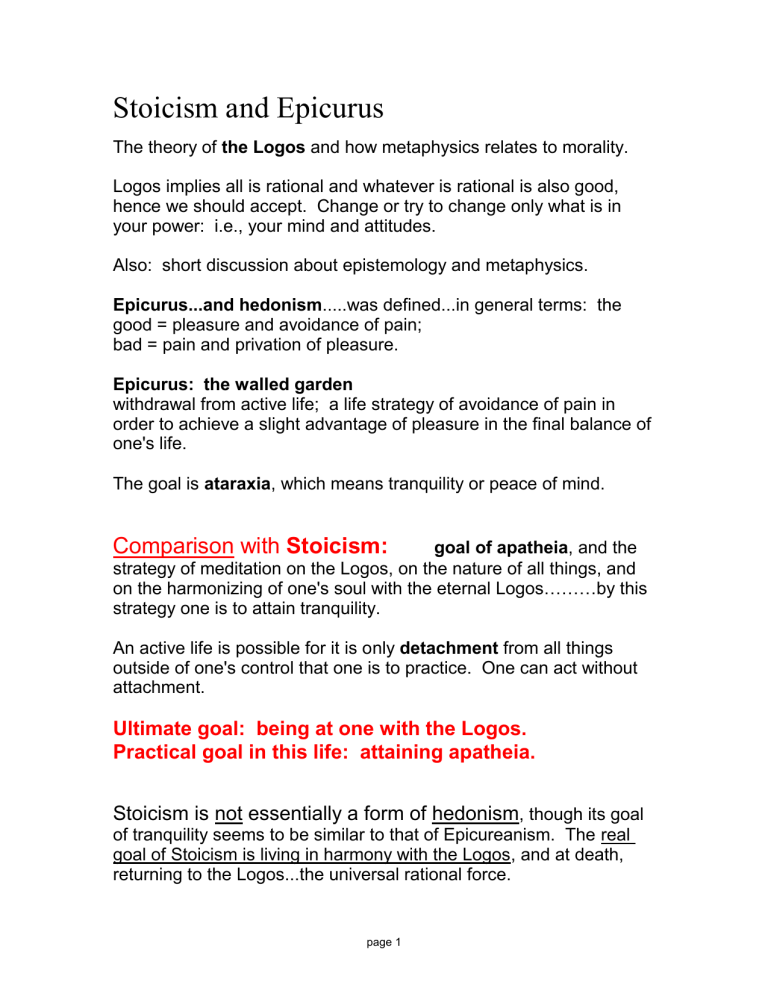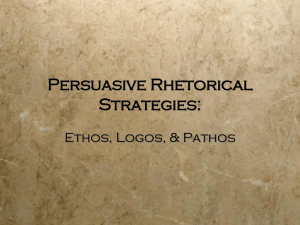Epicurus and Stoic philosophy compared

Stoicism and Epicurus
The theory of the Logos and how metaphysics relates to morality.
Logos implies all is rational and whatever is rational is also good, hence we should accept. Change or try to change only what is in your power: i.e., your mind and attitudes.
Also: short discussion about epistemology and metaphysics.
Epicurus...and hedonism .....was defined...in general terms: the good = pleasure and avoidance of pain; bad = pain and privation of pleasure.
Epicurus: the walled garden withdrawal from active life; a life strategy of avoidance of pain in order to achieve a slight advantage of pleasure in the final balance of one's life.
The goal is ataraxia , which means tranquility or peace of mind.
Comparison with Stoicism:
goal of apatheia , and the strategy of meditation on the Logos, on the nature of all things, and on the harmonizing of one's soul with the eternal Logos………by this strategy one is to attain tranquility.
An active life is possible for it is only detachment from all things outside of one's control that one is to practice. One can act without attachment.
Ultimate goal: being at one with the Logos.
Practical goal in this life: attaining apatheia.
Stoicism is not essentially a form of hedonism
, though its goal of tranquility seems to be similar to that of Epicureanism. The real goal of Stoicism is living in harmony with the Logos, and at death, returning to the Logos...the universal rational force. page 1
The dilemma of Stoicism: the Logos theory implies we should accept all; but the exhortation to become something different from what we are (i.e., become rational and control one's mind and emotions) implies that there is something, our souls or minds, which are free and undetermined by the Logos. How can there be this freedom of mind?
Still and all, Stoicism provides us with a tougher skin to face life's troubles, and an attitude of acceptance is often a wise course to follow, as it gives us some consolation and a believable view of the human condition:
……that we are subject to powers and forces quite beyond us and that life is a natural process with a beginning, some considerable suffering, and an end in death. Seeing this, it does make some sense to put in place a personal outlook to fit this otherwise overwhelming landscape. page 2
The doctrine of the brotherhood of man derives from the Logos being universally present in all men, as the rational part of their souls.
Immortality of the soul: for the Stoic sage only; but it seems it should be for all, as all have part of the divine Logos in them.
Contradiction in Stoicism:
If everything that happens is a result of the divine Logos, and if it is all rational and therefore good, then we should accept all, thereby gaining peace of mind for ourselves...apatheia. But then there is no freedom of choice. All events are determined by the
Logos. Our mental state is not, therefore, within our power to control.
If everything is not created by the Logos, (and therefore good), then we should not accept all. But then the Stoic peace of mind is lost.
If everything is determined, then there is no free will to choose, hence Stoic ethical exhortations are meaningless.
The Stoic will say we have it in our power to think and understand how we are a part of the Logos...part of the determined and rational universe. Are we not determined even in this sense though? I.e., even our rational insight must be determined...whether I think or not must be caused. page 3





